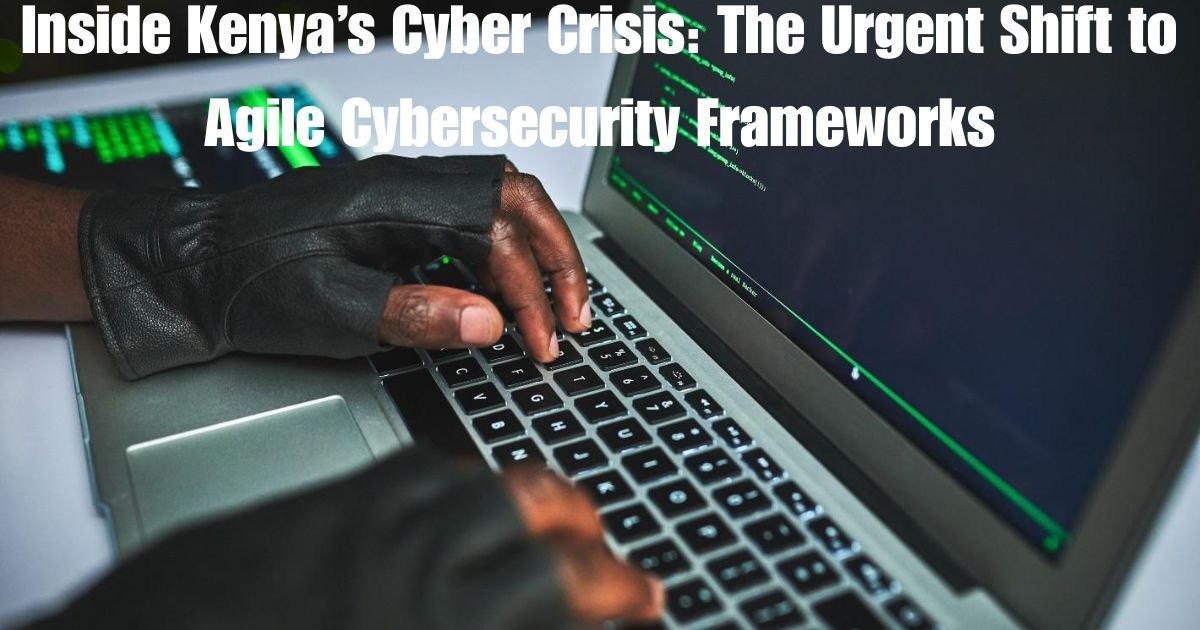The Urgent Shift to Agile Cybersecurity Frameworks
Kenya’s digital economy once a continental beacon of innovation and fintech disruption is currently under relentless siege from increasingly sophisticated cyber threats. From ransomware attacks on local banks to data breaches crippling SMEs the surge in cybercrime in East Africa threatens to unravel years of digital progress.
As Kenya competitions to digitize government services increase fintech access and build the Silicon Savannah, its cybersecurity frameworks remain dangerously outdated. The solution? A national pivot to agile adaptive and resilient cybersecurity strategies.
Also Read: Tragic Discovery Bodies of Couple in Arranged Marriage Found at Their Home
Kenya’s Cybersecurity Crisis: The Emerging Threat Landscape
In the first half of 2025 only:
- Over 1,200 cyberattacks were recorded against Kenyan companies (source: KE-CIRT/CC).
- At least three main data breaches exposed sensitive financial and personal data from banks and e-commerce platforms.
- A coordinated ransomware attack temporarily disabled Huduma Centre digital services in Nairobi and Mombasa.
The Kenya Communications Authority’s newest report confirms a 40% YoY spike in cyber threats targeting fintech government portals and SMEs. Digital transformation in Kenya while quick has showing massive structure and rule gaps.
Highest Cyber Threats in Kenya (2025):
- Phishing and credential harvesting
- Ransomware attacks on SMEs and public institutions
- Cloud vulnerabilities in digital banking platforms
- Supply chain attacks over third-party service providers
Business at Danger: Why the Status Quo Is Unsustainable
Kenyan startups digital retailers and fintech suppliers face mounting losses due to Cyberattacks, fraud and Regulatory non-compliance. In an economy where over 30% of GDP is Digitized cyber disruption could have distant-reaching implications:
- Eroded Community trust in digital systems
- Investor flight due to unstable digital infrastructure
- Service Interruptions across health, tax and service platforms
As the KRA investigates multiple tax system breaches and banks scramble to restore consumer trust the call for cybersecurity readiness has never been louder.

The Agile Cybersecurity Imperative: A Strategic Pivot
Traditional, rigid cybersecurity models no longer suffice. The developing threat landscape demands agile cybersecurity frameworks that are:
- Adaptive – Quickly respond to zero-day threats and evolving malware.
- Real-time – Use AI and behavioral analytics for real-time threat detection.
- Iterative – Continuously recover based on threat intelligence and post-attack reviews.
Main Components of an Agile Framework:
- Threat Intelligence Platforms (TIPs)
- Penetration testing as a service (PtaaS)
- Incident response automation
Lessons from Recent Kenyan Breaches
1. Kenyan Fintech Firm Compromised
A fast-growing Nairobi-based digital lender suffered a $2.5M loss due to API vulnerabilities. The company lacked incessant vulnerability scanning and failed to encrypt sensitive client data a clear breach of CBK cybersecurity regulations.
2. Huduma Centres Temporarily Offline
A Ransomware Infiltration targeted login credentials of county-level community servants. It showing the fragility of Kenya’s digital Government infrastructure and deficiency of Endpoint Pprotection Protocols.
Cyber Resilience for Kenyan Businesses: What You Should Do Now
Actionable Strategies for SMEs and Corporates:
- Conduct Cybersecurity Threat Audits quarterly.
- Backup Critical Systems and test disaster recovery plans.
- Adopt DevSecOps to embed security across app development.
The Policy and Regulatory Gap
While Kenya’s Digital Economy Blueprint is ambitious, regulatory enforcement is lagging. Cybersecurity compliance necessity evolve to match the velocity of digital adoption.
Urgent Policy Recommendations:
- Update Kenya ICT Security Policy (last revised in 2022)
- Enforce mandatory breach reporting for financial and healthcare companies
- Create regional EAC cybersecurity framework for cross-border digital trade
- Proposal tax incentives for SMEs investing in security infrastructure
The Regional Dimension
Cybercrime does not respect borders. Kenya’s digital interlinkage over Uganda, Tanzania and Rwanda means Cyber Threats in East African countries are intensely interconnected. The increase in cross-border fintech platforms, mobile payments and regional cloud data centers necessitates a pan-East African cybersecurity alliance.
